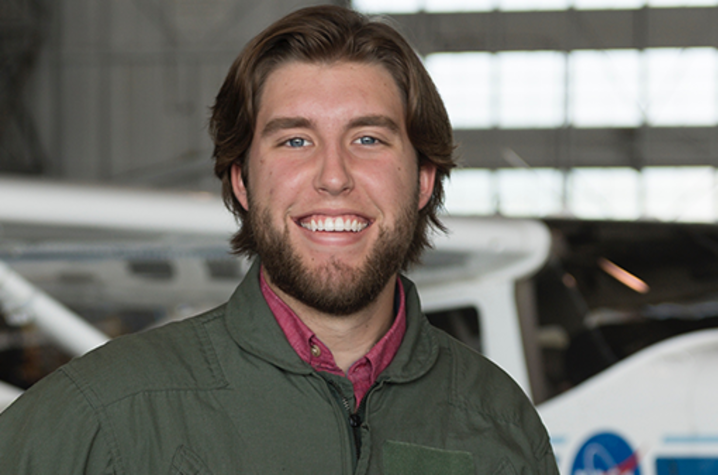How UK Spent the Summer: Senior Experiences Out of This World Internship

LEXINGTON, Ky. (Aug. 17, 2018) — Classes at the University of Kentucky offer students a world-class education but only internships can offer real world experience and confidence to enter a workplace. This is why UK students are highly encouraged, and in some cases required, to participate in internships or cooperative education programs.
Grant Cox, a native of Campbellsville, Kentucky, and senior computer engineering major spent his summer interning at the NASA Langley Research Center (LaRC) in Hampton, Virginia, which happens to be the oldest of NASA’s field centers. Read more below about Grant’s experience with NASA.
UKNow: Why did you choose to pursue a computer engineering degree?
Cox: Computer engineering stood out to me because of the blend of physical and abstract design. On one side of the spectrum, I’ve learned to build physical, useful circuits that are fully analog with zero software. On the other, I can design software and rarely have to consider the computer hardware that makes the software possible. The intersection of these two disciplines is where the emphasis of computer engineering lies — designing systems that are both analog and digital in nature. They are tangible, physical circuits, but they are controlled by software, and that gives the designer an incredible amount of control. All of those design aspects aligned with how my mind works and processes, and that’s why I chose to pursue this degree program.
UKNow: What is your favorite part of the engineering program at UK?
Cox: The staff is the crown jewel of UK’s engineering program. The institution has zealous faculty that are eager to assist students in any way possible. They won’t give you the answers because they are devoted to the learning process. They do an excellent job teaching us how to learn on our own and teach ourselves, which is more important than learning a specific skill in a discipline of engineering. Anyone with a strong work ethic and the desire for more than a diploma at the end of four years will benefit tremendously from the College of Engineering.
UKNow: Explain your role at NASA, what projects did you work on?
Cox: I got to work in the Safety Critical Avionics Branch. My time was spent understanding the physical workings and characteristics of electronic speed controllers (ESCs) and working with Dr. Kenneth Eure to build a mathematical model for them. ESCs are used to control brushless DC electric motors, which are used in electric cars, drones, rockets, dishwashers, electric bikes and about anything you can think of that uses a spinning electric motor. We have built several working prototypes. The ultimate goal of our project is to give designers new tools to push technology toward flying package deliveries, flying cars and more efficient travel. The research experience has been a wonderful opportunity. I’ve worked with new technology, gained new skills and interfaced with incredible people.
UKNow: What is the most important lesson you learned in your internship?
Cox: The advances I made in analog design were the best things I learned from this project. When you want to build a reliable system like an ESC it has to work, under reasonable and unreasonable conditions, or someone is likely to get hurt. Because of this, we had to design and consider problems that you normally don’t worry about.
UKNow: What was your favorite part of this internship?
Cox: The best part was the environment. Working with the other 4,000 employees and 300+ interns at LaRC was inspiring. I worked near the facility where simulations were done for the Apollo missions, next door to development of the ramjet and across campus from where all of the space capsules were tested for water landing. The very hangar that I worked in housed an underwater zero-gravity simulator in the 1960s. I have friends that are working on the solar sail project and others working on jet fuel chemistry that we could use in Mars’ atmosphere. There is no shortage of interesting projects!
UKNow: What is something you learned about NASA that you didn’t know before?
Cox: When you think about NASA, you usually think about rockets and missions to Mars, but that’s only part of it. I didn’t realize the extent of the research being done on terrestrial problems. They are designing new forms of jet propulsion, mapping physical characteristics of Earth with satellites, increasing the efficiency of air travel, and in my case, pushing the technology of electric flying vehicles forward.
UKNow: What drew you to apply for this specific program?
Cox: I knew that this would be an excellent opportunity for me to prepare for a potential career in the aerospace industry, and it is NASA, after all. I had several gracious faculty members at UK direct me toward applying in the application process. In particular, Dr. William Smith, Dr. Suzanne Smith and Dr. Donohue.
UKNow: What are your future ambitions and how has this internship prepared you?
Cox: I want to pursue opportunities in aerospace, and this is a great start. My “dream job” would be working on electronics and sensors for a space observatory or physical research lab. I hope to remain in the aerospace industry, and one day deviate toward a music electronics company or start my own.
For many, summer is a time to slow down, get a break from school and maybe take a vacation. At the University of Kentucky, summer is when our faculty, staff, clinicians and students prepare for a new school year, conduct research, treat patients and gain experience through internships and service work. Class may not be in session, but at UK we never slow down.




